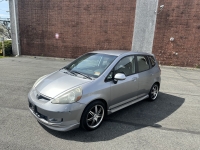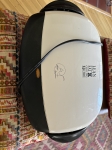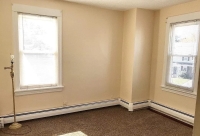Anxiety on the train-what to do?
I have found mindful meditation to be a great help for my insomnia. It's amazing that you can benefit from the effects of meditation many hours later after. In other words, if I meditate early in the morning it actually helps me sleep at night. I think it gives the mind a "vacation" of sorts. Our minds are very busy and crammed with all sorts of constant stimulus. My daughter suffers from anxiety. I cannot say enough how much anti-depressants have helped her. And me. Before she was treated, she would get terrible attacks in the middle of the night -- usually about 3:00 a.m. She would feel as if she had trouble breathing; full-blown panic. I would take her to the emergency room. My daughter also uses anti-anxiety medication. But she doesn't need it on a regular basis. Very often just the idea of having the meds with her can be enough to ward off the sensation of losing it.
Floorline, please let us know how things work out.
I agree! It feels good to not feel alone in this. I wouldn't want to call it a journey just yet. I'm claiming that I will overcome this one way or another. I guess since it happened I'm always anticipating that it will happen again, hence the episode yesterday. The thing was, I was able to focus even with the noise I was hearing standing at the vestibule. I appreciate your responses guys! Seriously!
PeggyC said:
I'm finding this thread both unsettling and comforting, strange to say. I thought I was the only person who suffers anxiety that can occasionally be crippling, and I thought I was in a tiny minority of people who felt that way about commuting in the horribly crowded trains. Now I know I'm not alone in those things! Which is, as I said, both comforting and strangely unsettling. I'm sorry so many people have to suffer that way in order to get to work.
I love the comments here about things like Thich Nhat Hanh (who is, indeed, wonderful), yoga, meditation, and the app "Calm," which I didn't know about. I will have to try all of these things. The comments about medications are also helpful.
For this kind of anxiety, which is so strongly tied to specific events, I would not take a medication that has to be taken regularly, build up in the system, then be weaned off when you want to stop. That doesn't seem right, to me. I think it makes a lot more sense to try to address the anxiety in other ways, or with Xanax.
I also have a bottle of Xanax that I keep for emergencies, and as others have pointed out, just having that bottle in my purse is sometimes enough to prevent a problem. Placebo effect of a sort?? I will never become addicted, because I only take it once a month or so, or a couple times a week when things are just too much to bear, e.g. the week of my mother's funeral. It's very good for situational stuff, unless you have an addictive personality. If that were the case, I'd say be very careful about any kind of medication for this purpose.
But definitely take the blood pressure medication religiously. The meditation/exercise/yoga/tai chi/and so on should help with that, also.
Books or plays on recordings could be helpful, too. I know how difficult it is to concentrate on reading when anxiety strikes, but hearing a recorded voice reading the book in your ear might be quite different and soothing. I used to listen to recorded Shakespeare plays to go to sleep.
Hang in there. You will find something that helps!
Knowing that you can take your anxiety meds allows your nervous system to not get hijacked by your sympathetic nervous system. Much anxiety is an anticipation or worry about frightening/unpleasant/stressful things or recalling of such. By having the cognitive thought, I have something that can take care of this problem, brings on some of the parasympathetic nervous system that brings a sense of okay-ness. Meditation is a practice that employs both the practice of bringing online the parasympathetic system and some amount of sympathetic to keep the mind alert while relaxed.
Meditation and breathing practices are great. They are often difficult to employ in the middle of a panic attack. That is why apps or music are great. Benzodiazapines are fine if not abused. The antidepressants are generally prescribed because they can be the most effective with the least side effect for many.
jeffl said:
Weaning off of antidepressants is no big deal. It doesn't make them dangerous drugs. You get no high from them. You get no immediate effects from taking them. They aren't addictive. Some people have to take them forever but they're happy with the trade off of feeling "normal" for the first time in years. That being said, Thich Nhat Hanh is the man. Peace Is Every Step may be my favorite "self help" book ever.
This must vary from person to person as it is definitely not always "no big deal". Not saying that it is dangerous to be on them as I don't think that is the case, but it isn't always all that pleasant (although it can beat the alternative.) And how can you say that they are "not addictive" when "weaning" is required to stop taking them?
sac said:
jeffl said:This must vary from person to person as it is definitely not always "no big deal". Not saying that it is dangerous to be on them as I don't think that is the case, but it isn't always all that pleasant (although it can beat the alternative.) And how can you say that they are "not addictive" when "weaning" is required to stop taking them?
Weaning off of antidepressants is no big deal. It doesn't make them dangerous drugs. You get no high from them. You get no immediate effects from taking them. They aren't addictive. Some people have to take them forever but they're happy with the trade off of feeling "normal" for the first time in years. That being said, Thich Nhat Hanh is the man. Peace Is Every Step may be my favorite "self help" book ever.
Addiction implies inappropriate use. Physical withdrawal symptoms upon stopping the drug or the need to wean off them slowly in order to avoid withdrawal symptoms in no way implies addiction or that the use of the drugs was inappropriate in any way.
eta: chemical dependence can be perfectly appropriate if treatment is needed. This is quite distinct from addiction, which always implies inappropriate use.
I used to get very distressing anxiety attacks on planes - but ONLY after landing, when I would look down the aisle and realize I couldn't get out b/c the aisle was full of people. Now, I make NO effort to get up or get ready to deplane until there's a clear shot. Just keep reading or doing a puzzle, maybe getting a drink of water or calling whoever's at my destination. Works like a charm. The key is to "not want" to be anywhere but in my seat.
In a one-off panic on a train, in a sleeping car, the key, oddly, was to put a blanket (or jacket?) over my head so I was "in control" of my own space and couldn't see that there was no way to get out of the compartment or off the train.
Not sure exactly how these would adapt to your situation, unless it would be to keep your focus very close, on a book or screen right there at your seat, and NOT look at the bigger picture.
Wishing you peace and relief!!
MJC, you sound like a master of coping with these situations. That's the same thing I began doing on planes, BTW. I would just calmly stay in my seat and keep reading my magazine or book. When the crowd started to thin, I'd get up, gather my stuff, and slowly make my way forward.
Tough to do in a crowded train, though. And it doesn't help that people on crowded trains tend to become less than human in their behavior. That is sad.
I hope the OP is getting as much out of this thread as I am. I'ts been very helpfull.
Yes, I am. I could go online and read about it. But firsthand experiences from people you know exist is a lot better 
Thanks!
GGartrell said:
I hope the OP is getting as much out of this thread as I am. I'ts been very helpfull.
I used to dislike breathing exercises & breathing-based meditation and stress-reduction, until I read, "The Healing Power of the Breath", by Richard Brown, (from Columbia Presbyterian), which is a pretty inexpensive paperback that comes with an instructional CD, which is excellent, can be learned in an evening. Thich Nhat Hanh, who several people have recommended here, has a set of breathing exercises or meditations that can be incorporated into the breathing approach once it is learned, that are easily googled. Others who have helpful readings, and a lot of free podcasts, YouTube videos and meditations include Tara Brach and Jack Kornfield.
by the way, the calm.com app has helped tremendously. Thank you for suggesting this. Last week was my second week of taking the water pill in the morning and that helped with the blood pressure, which also helped with my anxiety. There were days when I still felt anxious but dealt with it by closing my eyes while listening to the calming app. I really appreciate all the tips and advice!



















The key is to accept that you have anxiety. To fight it will only strengthen it.